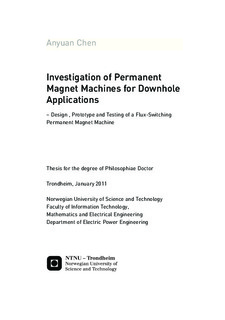| dc.contributor.advisor | Nilssen, Robert | nb_NO |
| dc.contributor.author | Chen, Anyuan | nb_NO |
| dc.date.accessioned | 2014-12-19T13:52:29Z | |
| dc.date.available | 2014-12-19T13:52:29Z | |
| dc.date.created | 2011-01-13 | nb_NO |
| dc.date.issued | 2011 | nb_NO |
| dc.identifier | 386834 | nb_NO |
| dc.identifier.isbn | 978-82-471-2564-9 | nb_NO |
| dc.identifier.uri | http://hdl.handle.net/11250/256986 | |
| dc.description.abstract | The current standard electrical downhole machine is the induction machine which is relatively inefficient. Permanent magnet (PM) machines, having higher efficiencies, higher torque densities and smaller volumes, have widely employed in industrial applications to replace conventional machines, but few have been developed for downhole applications due to the high ambient temperatures in deep wells and the low temperature stability of PM materials over time. Today, with the development of variable speed drives and the applications of high temperature magnet materials, it is increasingly interesting for oil and gas industries to develop PM machines for downhole applications.
Recently, some PM machines applications have been presented for downhole applications, which are normally addressed on certain specific downhole case. In this thesis the focus has been put on the performance investigation of different PM machines for general downhole cases, in which the machine outer diameter is limited to be small by well size, while the machine axial length may be relatively long. The machine reliability is the most critical requirement while high torque density and high efficiency are also desirable. The purpose is to understand how the special constraints in downhole condition affect the performances of different machines.
First of all, three basic machine concepts, which are the radial, axial and transverse flux machines, are studied in details by analytical method. Their torque density, efficiency, power factor and power capability are investigated with respect to the machine axial length and pole number. The presented critical performance comparisons of the machines provide an indication of machines best suitable with respect to performance and size for downhole applications.
Conventional radial flux permanent magnet (RFPM) machines with the PMs on the rotor can provide high torque density and high efficiency. This type of machine has been suggested for several different downhole applications. Flux-switching PM (FSPM) machines, which have the PMs located on the stator and are therefore more reliable, can theoretically also exhibit high torque density and relatively high efficiency. This thesis has put an emphasis on studying this type of machine. Two FSPM machines have been investigated in detail and compared by analytical method, FEM simulation and prototype measuremens. Their operating principle and important design parameters are also presented.
A lumped parameter magnetic circuit model for designing a high-torque FSPM machine is newly introduced and the designed machine is verified by FEM simulations. A prototype machine with an outer diameter of 100 mm and an axial length of 200 mm is built in the laboratory and tested at room temperature. Based on that, the machine performance at an ambient temperature of 150°C is also predicted. The results show that the FSPM machine can provide a high torque density with slight compromise of efficiency and power factor.
Choosing a proper machine type is significantly dependent on the application specifications. The presented results in this thesis can be used as a reference for selecting the best machine type for a specific downhole case. | nb_NO |
| dc.language | eng | nb_NO |
| dc.publisher | NTNU | nb_NO |
| dc.relation.ispartofseries | Doctoral Theses at NTNU, 1503-8181; 2011:23 | nb_NO |
| dc.subject | Permanent Magnet Machine; Flux-Switching PM machine; Downhole applications; oil and gas | en_GB |
| dc.title | Investigation of Permanent Magnet Machines for Downhole Applications: _ Design, Prototype and Testing of a Flux-Switching Permanent Magnet Machine | nb_NO |
| dc.type | Doctoral thesis | nb_NO |
| dc.source.pagenumber | 141 | nb_NO |
| dc.contributor.department | Norges teknisk-naturvitenskapelige universitet, Fakultet for informasjonsteknologi, matematikk og elektroteknikk, Institutt for elkraftteknikk | nb_NO |
| dc.description.degree | PhD i elkraftteknikk | nb_NO |
| dc.description.degree | PhD in Electric Power Engineering | en_GB |
